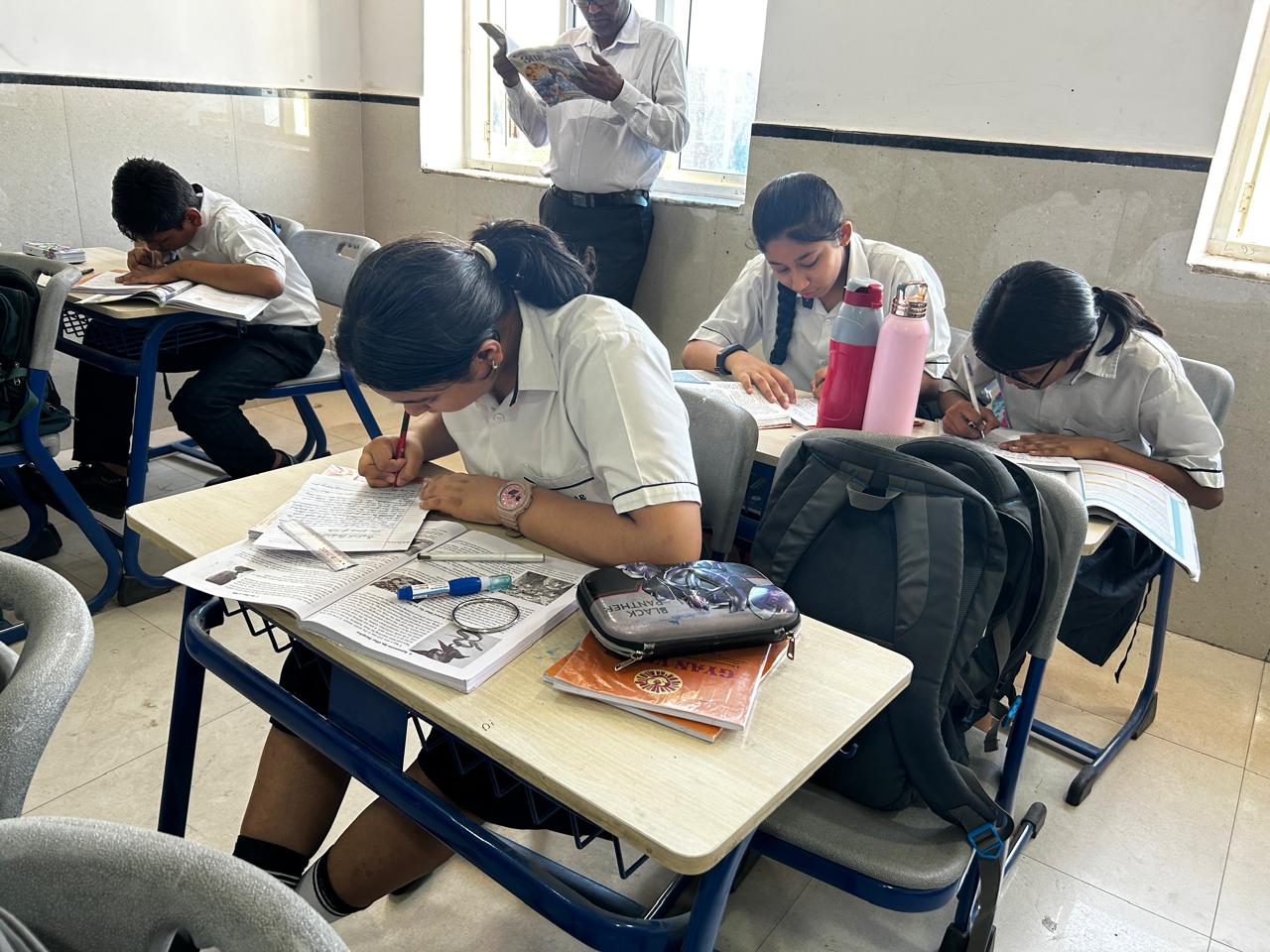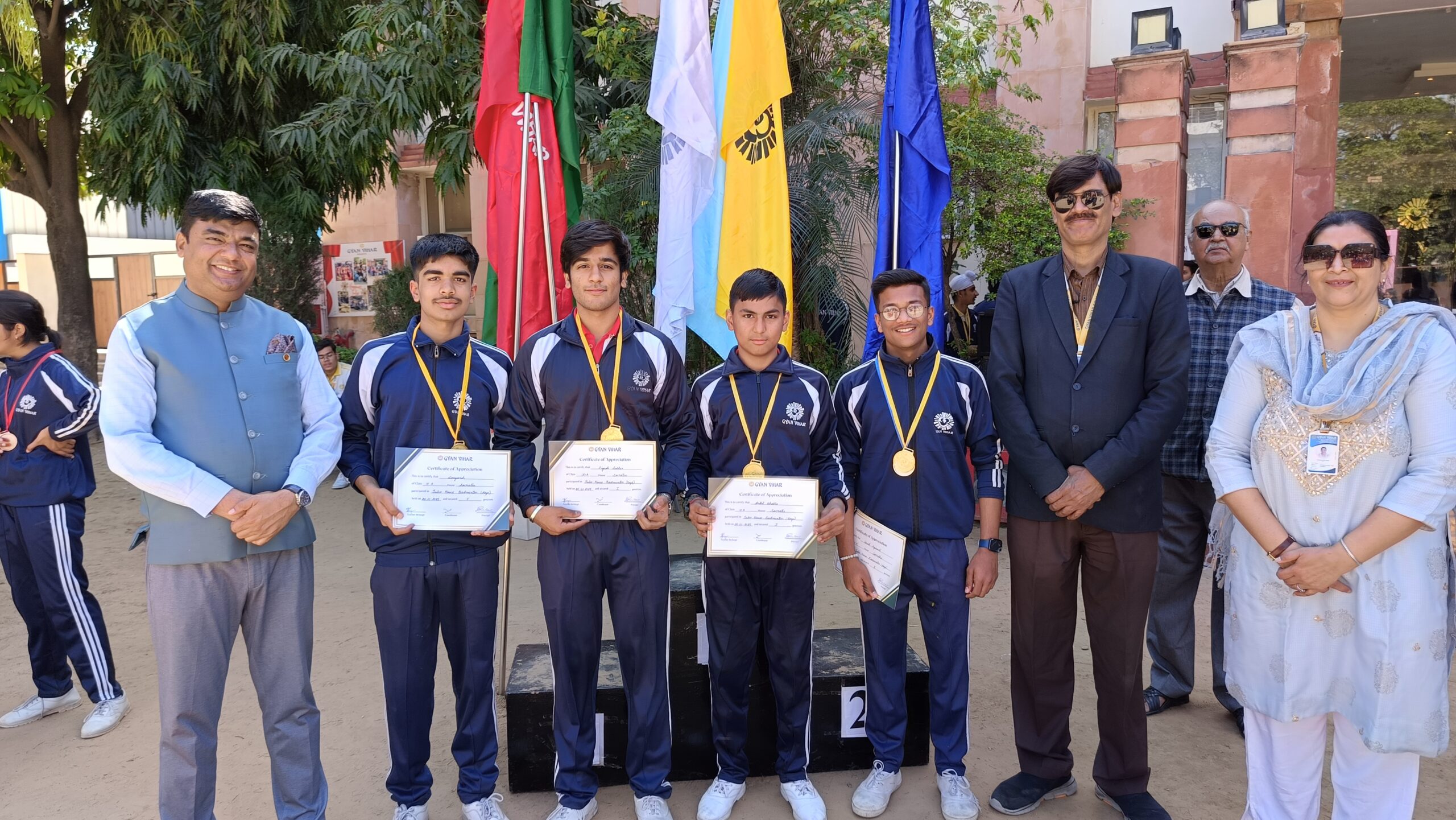In India, the land of vibrant traditions and rich cultural heritage, mothers hold a place of immense respect and reverence. Their role goes far beyond simply raising children; they are the cornerstones of families, the nurturers of traditions, and the embodiment of love and sacrifice. This blog, brought to you by Gyan Vihar World School, a leading CBSE school in Jaipur and one of the Top Schools in Jaipur, explores the multifaceted role mothers play in Indian culture.
The Revered Status of Mothers in Hinduism
Hinduism elevates mothers to a position of immense respect and reverence. Here’s a closer look at the factors contributing to this status:
-
The deification of the Feminine:
The Hindu pantheon is rich with powerful goddesses who embody various aspects of motherhood.
- Durga: The embodiment of strength, protection, and fierce maternal love. She symbolizes the power mothers possess to protect their children from harm.
- Parvati: The epitome of love, devotion, and unwavering support. She represents the nurturing and self-sacrificing nature of mothers.
- Lakshmi: The goddess of prosperity and auspiciousness. She signifies the blessings mothers bestow upon their children, ensuring their well-being and success.
-
Scriptures and Epics:
Ancient Hindu texts like the Vedas and epics like the Ramayana and Mahabharata highlight the importance of mothers:
- The Vedas: These sacred texts emphasize the concept of “Matru Devo Bhava” (Revere Your Mother), placing mothers on an equal pedestal with fathers and deities.
- The Ramayana: The story of Sita, Rama’s wife, exemplifies the ideal of a devoted and selfless wife and mother, facing hardships with unwavering strength.
- The Mahabharata: The epic features several strong and influential mothers, showcasing their impact on shaping destinies and guiding their children.
-
Rituals and Traditions:
Hindu rituals and traditions reinforce the respect accorded to mothers:
- Puja (Worship): Many Hindu households perform puja dedicated to goddesses like Durga or Lakshmi, acknowledging the divine essence of motherhood.
- Mata ki Chowki (Night Vigil for Mother): This devotional practice involves staying awake all night, singing hymns, and offering prayers in honor of the mother goddess.
- Aarti (Offering of Light): The aarti ritual is often performed to respect elders, including mothers, symbolizing their divine light and guidance.
Beyond Religion: The Cultural Significance of Mothers
The reverence for mothers transcends religious boundaries and forms the bedrock of Indian culture. Here are some key aspects that highlight this significance:
-
Festivals Celebrating Mothers:
Several Indian festivals celebrate mothers and their contributions:
- Mother’s Day: While a western concept, Mother’s Day has been enthusiastically adopted in India, providing a day to express love and gratitude for mothers.
- Teej: Celebrated primarily in North India, Teej is a monsoon festival dedicated to Goddess Parvati, symbolizing the well-being of wives and mothers.
- Durga Puja: This grand festival worships Durga, the fierce mother goddess, celebrating her victory over evil and highlighting the importance of strength and protection in motherhood.
-
The Strength of the Matriarchal System:
In some parts of India, particularly in the South, a matriarchal system prevails:
- Inheritance Laws: Property and wealth are passed down through the female line, empowering mothers and daughters within the family structure.
- Decision-Making Power: Mothers often hold significant decision-making power regarding household finances, upbringing of children, and family matters.
- Respect for Women: The matriarchal system fosters a culture of respect for women, with mothers as the central figures commanding respect and authority.
-
Respect for Elders:
Indian culture emphasizes respect for elders, and mothers, as the senior figures within the family, are revered:
- Terms of endearment: Children traditionally address their mothers with terms like “Maa” or “Amma,” signifying deep affection and respect.
- Blessing of Mothers: A mother’s blessing is considered auspicious and crucial for success in life. Children often seek their mother’s blessings before embarking on new endeavors.
- Care for Elderly Mothers: Taking care of elderly parents, especially mothers, is considered a sacred duty in Indian culture, fostering a strong sense of filial piety.
Mothers as Nurturers and Educators
The role of a mother in Indian society extends far beyond simply providing physical care. Here’s a detailed look at how mothers nurture and educate their children:
-
Preserving Traditions and Values:
Mothers play a crucial role in transmitting cultural heritage from one generation to the next:
- Storytelling: Mothers share traditional stories, folktales, and epics, passing down cultural values, moral lessons, and historical knowledge.
- Religious Practices: Mothers involve their children in religious rituals and customs, fostering a sense of cultural identity and belonging.
- Art and Music: Many mothers introduce their children to traditional art forms like dance and music, preserving these cultural treasures.
-
Instilling Moral Values:
Mothers play a vital role in shaping their children’s moral compass and ethical code:
- Honesty and Truthfulness: Mothers emphasize the importance of honesty and truthfulness, teaching children to be upright and ethical individuals.
- Compassion and Generosity: Mothers encourage acts of kindness and compassion, fostering a sense of empathy and social responsibility in their children.
- Respect for Elders and Teachers: Respect for elders and teachers is deeply ingrained in Indian culture. Mothers instill this value in their children, promoting a sense of hierarchy and respect for authority figures.
- Discipline and Self-Control: Mothers provide guidance and discipline, helping children develop self-control, responsible behavior, and a strong work ethic.
-
The Importance of Education:
Indian mothers, even in rural areas, prioritize their children’s education:
- Sacrifices for Education: Mothers often make personal sacrifices, working long hours or managing household chores efficiently, to ensure their children can access quality education.
- Value of Knowledge: Mothers instill the value of education in their children, encouraging them to learn, acquire new skills, and strive for academic excellence.
- Parental Support: Mothers actively participate in their children’s education, attending school functions, helping with homework, and providing emotional support throughout their academic journey.
The Changing Landscape: Balancing Tradition and Modernity
Indian society is undergoing rapid change, impacting the role of mothers in the family. Here’s a glimpse into how tradition and modernity are being balanced:
-
Women in the Workforce:
A growing number of Indian women are pursuing careers, contributing significantly to the family’s economic well-being:
- Shared Responsibilities: This necessitates a shift towards shared childcare and household responsibilities between mothers and fathers, promoting gender equality within the family.
- Support Systems: The need for reliable childcare and support systems, like crèches or grandparents’ involvement, becomes crucial to ensure a healthy balance for working mothers.
- Flexible Work Arrangements: Companies are increasingly recognizing the need for flexible work arrangements to support working mothers and promote a healthy work-life balance.
-
Nuclear Families and Changing Dynamics:
The traditional joint family system is gradually giving way to nuclear families:
- Increased Burden on Mothers: In nuclear families, mothers often shoulder the sole responsibility of childcare and domestic duties, requiring them to be resourceful and manage their time efficiently.
- Importance of Paternal Involvement: Active involvement of fathers in child-rearing becomes crucial in nuclear families to provide support and share responsibilities with mothers.
- Building Support Networks: Nuclear families may need to build strong support networks, relying on extended family, friends, or childcare services for assistance.
-
Technology and Changing Influences:
The rise of technology presents both challenges and opportunities for mothers:
- Responsible Technology Use: Mothers need to guide their children in using technology responsibly, ensuring it complements their education and doesn’t hinder real-world interaction.
- Managing Screen Time: Setting clear boundaries and managing screen time is crucial to prevent addiction and ensure children engage in other activities vital for development.
- Leveraging Technology for Learning: Mothers can utilize educational apps and online resources to supplement their children’s learning and broaden their horizons.
Gyan Vihar World School: Celebrating Mothers and Empowering the Next Generation
At Gyan Vihar World School, a Top School in Jaipur, we understand the invaluable role mothers play in shaping future generations. We celebrate mothers and empower them through various initiatives:
-
Parent-Teacher Associations:
We foster strong relationships with parents through active PTAs. These platforms provide mothers with a space to connect, share experiences, and access resources related to child development, parenting strategies, and mental well-being. Mothers can voice their concerns and suggestions, contributing to a collaborative learning environment for both parents and teachers.
-
Workshops and Seminars:
We organize workshops and seminars on various topics relevant to mothers, such as communication skills, emotional intelligence, and managing work-life balance. These sessions empower mothers with the knowledge and tools needed to navigate the complexities of modern parenthood.
-
Celebrating Mother’s Day and Other Special Occasions:
We celebrate Mother’s Day with heartfelt events and activities that allow students to express their gratitude and appreciation for their mothers. Similarly, we acknowledge the significance of mothers in other regional festivals, fostering a sense of cultural pride and appreciation.
Mothers, the Pillars of Our Society
Mothers are the pillars of our society, shaping future generations with their love, sacrifice, and unwavering dedication. As we celebrate their contributions, let us also acknowledge the challenges they face and strive to create a supportive environment where they can thrive.
Gyan Vihar World School, one of the Best Schools in Jaipur, recognizes the importance of mothers and their irreplaceable role in a child’s life. We are committed to empowering mothers and fostering a culture of respect and appreciation for their invaluable contributions.
Let us all take a moment to appreciate the mothers in our lives. Their love and guidance are the foundation upon which we build our futures.







